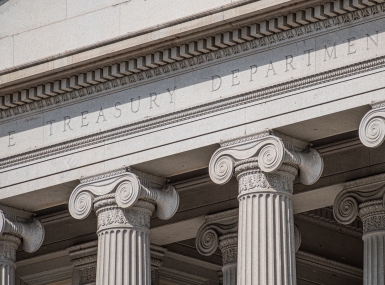Supreme Court will hear case on internet sales tax collection

Supreme Court will hear case to determine if states and local governments can require retailers to collect sales tax even if they don't have a physical location in the state
In November 2017, a Government Accountability Office report estimated that states and local governments could “gain from about $8 billion to about $13 billion in 2017 if states were given authority to require sales tax collection from all remote sellers.”
Two months later, in January, the Supreme Court agreed to decide South Dakota v. Wayfair. In this case South Dakota is asking the Supreme Court to rule that states and local governments may require retailers with no in-state physical presence to collect sales tax.
The decision is huge news for states and local governments. This article describes how we got here and why it is likely South Dakota will win.
In 1967 in National Bellas Hess v. Department of Revenue of Illinois, the Supreme Court held that per its Commerce Clause jurisprudence, states and local governments cannot require businesses to collect sales tax unless the business has a physical presence in the state.
Twenty-five years later in Quill v. North Dakota (1992), the Supreme Court reaffirmed the physical presence requirement but admitted that “contemporary Commerce Clause jurisprudence might not dictate the same result” as the court had reached in Bellas Hess.
Customers buying from remote sellers still owe sales tax but they rarely pay it when the remote seller does not collect it. Congress has the authority to overrule Bellas Hess and Quill but has thus far not done so.
To improve sales tax collection, Colorado began requiring remote (internet and catalogue) sellers in 2010 to inform Colorado purchasers annually of their purchases and send the same information to the Colorado Department of Revenue. The Direct Marketing Association sued Colorado in federal court, claiming that the notice and reporting requirements were unconstitutional under Quill. The issue the Supreme Court decided in Direct Marketing Association v. Brohl (2014), was whether the Tax Injunction Act barred a federal court from deciding this case. The Supreme Court held that it did not.
The State and Local Legal Center (SLLC) filed an amicus brief in Direct Marketing Association v. Brohl describing the devastating economic impact of Quill on states and local governments. Justice Anthony Kennedy wrote a concurring opinion stating that the “legal system should find an appropriate case for this court to reexamine Quill.” Justice Kennedy criticized Quill for many of the same reasons the SLLC stated in its amicus brief. Specifically, internet sales have risen astronomically since 1992 and states and local governments have been unable to collect most taxes due on sales from out-of-state vendors.
Following the Kennedy opinion, a number of state legislatures passed laws requiring remote vendors to collect sales tax, in clear violation of Quill. South Dakota’s law was the first ready for Supreme Court review.
In September 2017, South Dakota’s highest state court ruled that the South Dakota law was unconstitutional because it clearly violates Quill and it is up to the U.S. Supreme Court to overrule Quill. In October, South Dakota petitioned the Supreme Court to hear its case and overrule Quill. The SLLC filed an amicus brief supporting South Dakota’s petition. The Supreme Court ultimately agreed to decide the case.
It seems likely the Supreme Court will rule in favor of South Dakota and overturn Quill for a number of reasons. It is unlikely the Supreme Court accepted this case to congratulate the South Dakota Supreme Court on correctly ruling that South Dakota’s law is unconstitutional. Said another way, if the Supreme Court wanted to leave the Quill rule in place it probably would have simply refused to hear South Dakota v. Wayfair.
It is easy to count at least three votes in favor of South Dakota in this case. First, Justice Kennedy of course. Second, Justice Clarence Thomas. While he voted against North Dakota in Quill he has since entirely rejected the concept of the dormant Commerce Clause, on which the Quill decision rests. Third, Justice Neil Gorsuch. The Tenth Circuit ultimately decided Direct Marketing Association v. Brohl ruling that Colorado’s notice and reporting law didn’t violate Quill. Then-Judge Gorsuch wrote a concurring opinion strongly implying that, given the opportunity, the Supreme Court should overrule Quill.
That said, the Supreme Court, and the Roberts court in particular, is generally reticent about overturning precedent, as the Quill decision illustrates. The Supreme Court looks at five factors in determining whether to overrule a case. One factor is whether a rule has proven “unworkable” and/or “outdated . . . after being ‘tested by experience.’” This factor weighs strongly in favor of overturning Quill. As Justice Kennedy pointed out in Direct Marketing Association v. Brohl: “When the Court decided Quill, mail order sales in the United States totaled $180 billion. But in 1992, the Internet was in its infancy. By 2008, e-commerce sales alone totaled $3.16 trillion per year in the United States.”
If the court hears the case this term, it will issue an opinion by the end of June.
NACo is a founder, a funder and a board member of the State and Local Legal Center (SLLC), headquartered in Washington, D.C. The center extends NACo’s advocacy on behalf of counties to the highest court in the land.
Attachments
Related News

County Countdown – April, 22, 2024
Every other week, NACo’s County Countdown reviews top federal policy advocacy items with an eye towards counties and the intergovernmental partnership.

White House OMB releases final revisions federal Uniform Guidance (2 CFR Part 200)
The White House OMB released final revisions to the federal Uniform Guidance that outline compliance and reporting requirements for federal financial assistance.

Treasury Department releases new obligation guidance for the ARPA State and Local Fiscal Recovery Fund
On March 29, the U.S. Department of Treasury released new FAQs related to their Obligation Interim Final Rule for the ARPA Recovery Fund.
